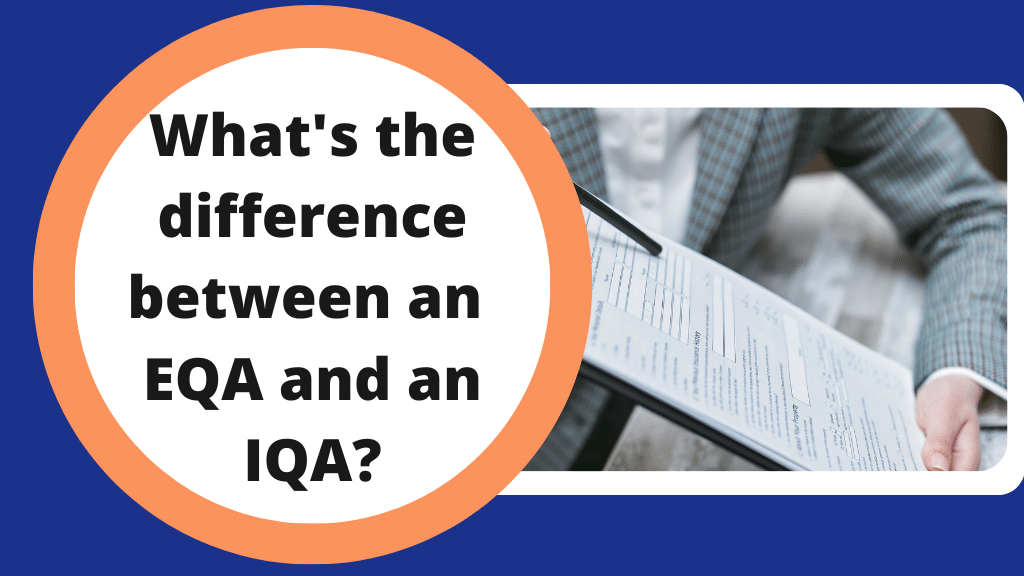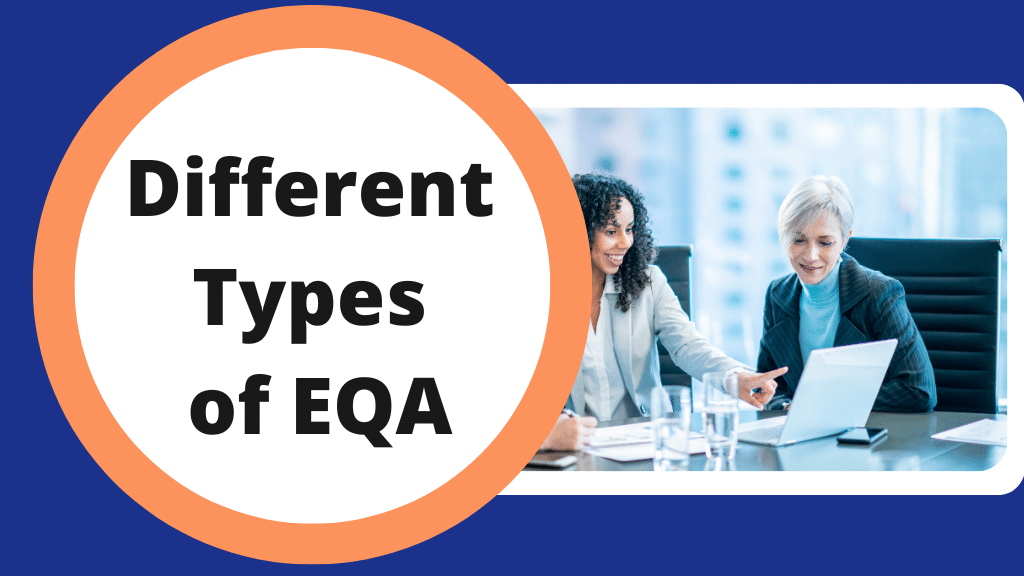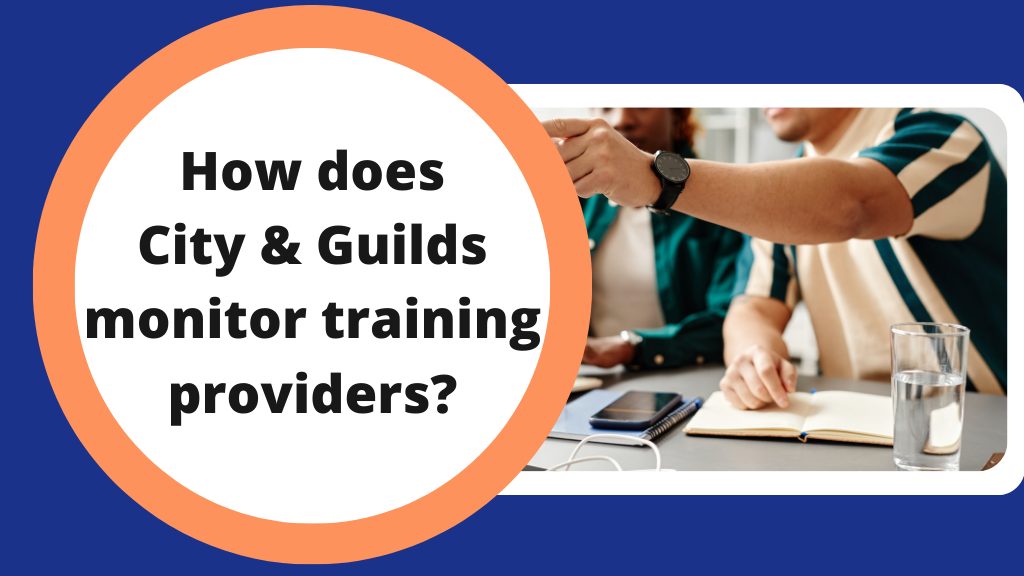May 23, 2023
What is the difference between EQA and IQA?

If you’re working in the education and training sector, you’re most likely following external and internal quality assurance practices, possibly without even realising it. But when it comes to quality assurance and the individuals involved in it, it’s quite common to be unclear about the difference between EQA and IQA, and what these professionals actually do.
Whether you’re exploring your options for a career in quality assurance or you’re just keen to learn more before your next EQA/IQA visit, it’s important to understand the difference between these two roles and the areas they cover.
What does EQA & IQA stand for?
Depending on the context, EQA stands for External Quality Assurance or External Quality Assurer, and IQA stands for Internal Quality Assurance or Internal Quality Assurer.
There have been various names for IQAs and EQAs in the past, these include:
- Internal Verifiers
- External Verifiers
- Moderators
- Internal Auditors
- External Auditors
Nowadays, these terms are considered outdated. This is mainly because they imply IQAs and EQAs only carry out checks as part of their job and this doesn’t reflect the support and guidance expected of modern quality assurance and those involved with it.
The Difference Between EQA and IQA
While EQAs and IQAs contribute to maintaining quality, IQAs focus on this internally, while EQAs work externally to uphold quality standards in education and training.
IQAs are responsible for self-auditing within educational or training organisations. They are typically responsible for checking, maintaining and improving the quality of the training or assessments provided by whichever institution they work for.
EQAs, on the other hand, conduct audits on behalf of an awarding body, verifying the effectiveness of IQA processes and guaranteeing consistent qualification standards across various learning providers. They aim to provide support, feedback, and guidance to centres while improving the quality of provision and assessment practices.
Internal Quality Assurance
Internal Quality Assurers (IQAs) play a key role in monitoring and evaluating assessments, course content and overall learner experience. They make sure that everything aligns with the institution’s responsibilities as a training provider in terms of quality. An IQA’s work is continuous and involves a great deal of planning, monitoring, and checking. They look at teaching and learning processes and provide feedback to tutors and assessors, helping them improve their approaches and techniques.
One of the main aims of internal quality assurance is to ensure that learners receive high-quality, consistent education, training and assessments, irrespective of the trainer, assessor or location.
Remember when you were at school and some teachers gave you really hard tests and lessons, yet others gave their pupils great marks however well they performed?
An IQA’s role is to make sure that this sort of inconsistency doesn’t happen in adult education and training.
Internal Quality Assurers also have an important part to play in ensuring that their organisation complies with all the requirements of the Awarding Body.
Since Awarding Bodies approve “centres” such as training companies, colleges, education institutions etc. to offer their qualifications, these Awarding Bodies have lots of requirements in terms of how centres recruit, enrol, teach and assess candidates.
Failing to meet these requirements can result in a plethora of bad things, ranging from a minor rebuke with a request to improve to a total cancellation of approval. This could mean that the centre is no longer able to offer the qualifications and the candidates they have already aren’t able to continue with their education programme.
An important part of an IQA’s job is to make sure that none of this happens, so they often sample teachers’ and assessors’ work to check that staff are assessing correctly, professionally and to fair standards.
How do I become an IQA?
To become an IQA, you will need an IQA qualification. There are 3 different IQA qualifications depending on what level of responsibility you want within your role:
Level 4 IQA Qualification in the Internal Quality Assurance of Assessment Processes and Practice
This is the most widely recognised IQA qualification because it covers all the elements you need to carry out internal quality assurance professionally.
Level 4 Award in Understanding the Internal Quality Assurance of Assessment Processes and Practice
This is the theory-only version of the IQA course above. It’s best suited for those who need a basic IQA qualification to support their current role.
Level 4 Certificate in Leading the Internal Quality Assurance of Assessment Processes and Practice
This is a lead IQA course designed for IQAs hoping to advance their careers and manage a team of IQAs within their organisation.
If you’re still unsure of what you need, our guide to IQA qualifications covers this in more detail.
External Quality Assurance
An EQA, or External Quality Assurer, is like an external auditor working on behalf of an awarding body rather than the centre itself. These awarding bodies are generally those regulated by OFQUAL, Qualifications Wales or the Scottish Qualifications Authority. But depending on the sector and the type of courses being offered they could also be from industry regulators, trade bodies or other quangos.
EQAs are key for ensuring that qualification standards are consistent across different learning providers. So that no matter where a candidate enrols, they get the same fair, consistent and accurate assessments and an equally good chance of gaining the qualification.
An EQA is independent of the centres they work with, hence the “external” element in their title. They don’t work for the centres, so they don’t teach or assess candidates at the centres. Instead, they verify that the IQA and Internal Quality Assurance processes are functioning effectively at the centres and that the assessments carried out are to the standard required by the Awarding Body. They also review the policies, procedures, and practices of the institution, checking that the whole qualification delivery is robust and effective.
However, EQA visits are not designed to just check things and find faults. EQAs should offer advice and guidance to the centres they work with and help to improve the quality of provision and assessment practices where needed. This ensures learners achieve the intended outcomes of their qualifications, the whole system is up to date, and that centres have competent staff throughout.
How do I become an EQA?
There are two External Quality Assurance courses you can take to start or advance your career as an EQA.
Level 4 EQA Award in Understanding the External Quality Assurance of Assessment Processes and Practice
This is a theory-based course best suited for IQAs looking to expand their knowledge of external quality assurance. If you don’t come from a quality assurance background already, this course doesn’t provide enough knowledge or the correct units for you to qualify as an EQA.
Level 4 Award in External Quality Assurance of Assessment Processes and Practice
Known as the full EQA course, this course is designed for anyone looking to start or advance their career within external quality assurance.
EQA/IQA Visits
It’s common to discuss EQA and IQA visits with a worried tone or with sense of dread. It doesn’t help that EQAs and IQAs are often both spoken about together and sometimes the terms are used interchangeably. This causes even more confusion around their visits because the difference between EQA and IQA is unclear. By understanding what EQAs and IQAs are, their roles, and how they differ, you can eliminate much of the worry, stress and uncertainty surrounding these terms.
To understand why people might dread EQA and IQA visits, consider that part of their work involves finding and rectifying errors or problems. If problems are discovered, they could lead to extra work, changes in centre procedures, or even sanctions from the Awarding Body.
Therefore, the apprehension surrounding these visits often stems from a fear of potential problems being unearthed. However, it’s essential to remember that unless the EQAs and IQAs carry out their work, then these problems could get a lot worse! Their ultimate aim is not to create stress or anxiety but to ensure quality, consistency and compliance in the education and training sector. Here’s an in-depth look at an EQA visit if you’re curious!
So EQA and IQA audits are not about ‘catching you out’. They are about maintaining and enhancing the quality of education or training. So, the next time you hear someone say, “Oh, we’ve got the IQA in today, I hope she doesn’t find any problems”, or “I’m always worried about EQA visits”, remind them, and yourself, of the essential role they play in upholding the quality and integrity of education and training. They exist to make sure that every learner gets a fair, high-quality learning experience, and that the qualifications they receive are credible and worth the effort that has been put into them.
You should think of your EQA or IQA assessor as somebody who is on your side, making sure that everything runs smoothly at your centre and that the needs of the awarding body, candidates and team are all met.
Next ›‹ Previous
Back to Blog








